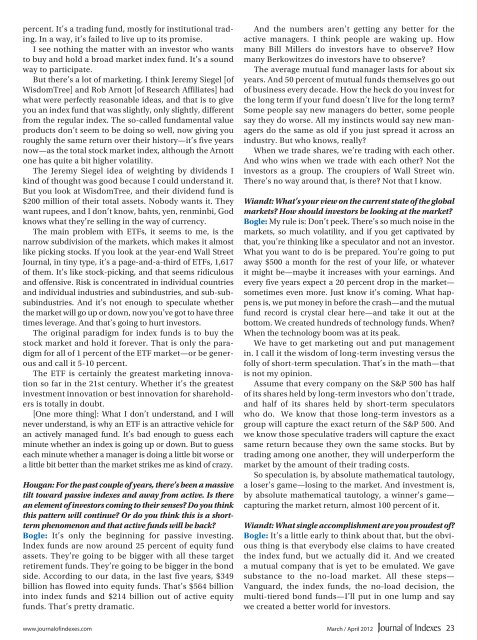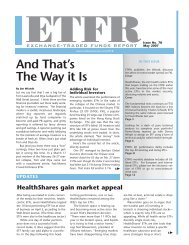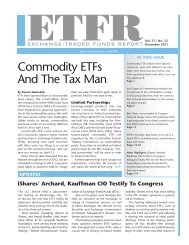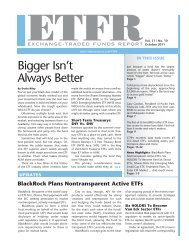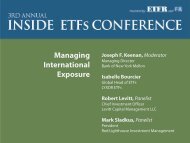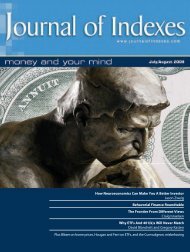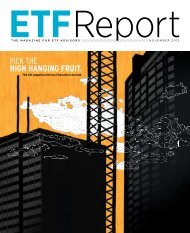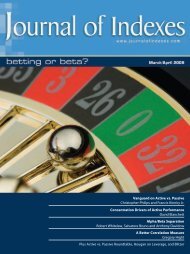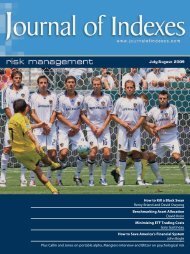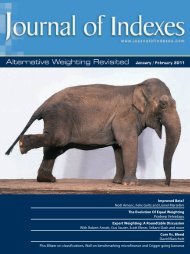You also want an ePaper? Increase the reach of your titles
YUMPU automatically turns print PDFs into web optimized ePapers that Google loves.
percent. It’s a trading fund, mostly for institutional trading.<br />
In a way, it’s failed to live up to its promise.<br />
I see nothing <strong>the</strong> matter with an investor who wants<br />
to buy and hold a broad market index fund. It’s a sound<br />
way to participate.<br />
But <strong>the</strong>re’s a lot of marketing. I think Jeremy Siegel [of<br />
WisdomTree] and Rob Arnott [of Research Affiliates] had<br />
what were perfectly reasonable ideas, and that is to give<br />
you an index fund that was slightly, only slightly, different<br />
from <strong>the</strong> regular index. The so-called fundamental value<br />
products don’t seem to be doing so well, now giving you<br />
roughly <strong>the</strong> same return over <strong>the</strong>ir history—it’s five years<br />
now—as <strong>the</strong> total stock market index, although <strong>the</strong> Arnott<br />
one has quite a bit higher volatility.<br />
The Jeremy Siegel idea of weighting by dividends I<br />
kind of thought was good because I could understand it.<br />
But you look at WisdomTree, and <strong>the</strong>ir dividend fund is<br />
$200 million of <strong>the</strong>ir total assets. Nobody wants it. They<br />
want rupees, and I don’t know, bahts, yen, renminbi, God<br />
knows what <strong>the</strong>y’re selling in <strong>the</strong> way of currency.<br />
The main problem with ETFs, it seems to me, is <strong>the</strong><br />
narrow subdivision of <strong>the</strong> markets, which makes it almost<br />
like picking stocks. If you look at <strong>the</strong> year-end Wall Street<br />
Journal, in tiny type, it’s a page-and-a-third of ETFs, 1,617<br />
of <strong>the</strong>m. It’s like stock-picking, and that seems ridiculous<br />
and offensive. Risk is concentrated in individual countries<br />
and individual industries and subindustries, and sub-subsubindustries.<br />
And it’s not enough to speculate whe<strong>the</strong>r<br />
<strong>the</strong> market will go up or down, now you’ve got to have three<br />
times leverage. And that’s going to hurt investors.<br />
The original paradigm for index funds is to buy <strong>the</strong><br />
stock market and hold it forever. That is only <strong>the</strong> paradigm<br />
for all of 1 percent of <strong>the</strong> ETF market—or be generous<br />
and call it 5-10 percent.<br />
The ETF is certainly <strong>the</strong> greatest marketing innovation<br />
so far in <strong>the</strong> 21st century. Whe<strong>the</strong>r it’s <strong>the</strong> greatest<br />
investment innovation or best innovation for shareholders<br />
is totally in doubt.<br />
[One more thing]: What I don’t understand, and I will<br />
never understand, is why an ETF is an attractive vehicle for<br />
an actively managed fund. It’s bad enough to guess each<br />
minute whe<strong>the</strong>r an index is going up or down. But to guess<br />
each minute whe<strong>the</strong>r a manager is doing a little bit worse or<br />
a little bit better than <strong>the</strong> market strikes me as kind of crazy.<br />
Hougan: For <strong>the</strong> past couple of years, <strong>the</strong>re’s been a massive<br />
tilt toward passive indexes and away from active. Is <strong>the</strong>re<br />
an element of investors <strong>com</strong>ing to <strong>the</strong>ir senses? Do you think<br />
this pattern will continue? Or do you think this is a shortterm<br />
phenomenon and that active funds will be back?<br />
Bogle: It’s only <strong>the</strong> beginning for passive investing.<br />
Index funds are now around 25 percent of equity fund<br />
assets. They’re going to be bigger with all <strong>the</strong>se target<br />
retirement funds. They’re going to be bigger in <strong>the</strong> bond<br />
side. According to our data, in <strong>the</strong> last five years, $349<br />
billion has flowed into equity funds. That’s $564 billion<br />
into index funds and $214 billion out of active equity<br />
funds. That’s pretty dramatic.<br />
www.journalofindexes.<strong>com</strong><br />
And <strong>the</strong> numbers aren’t getting any better for <strong>the</strong><br />
active managers. I think people are waking up. How<br />
many Bill Millers do investors have to observe? How<br />
many Berkowitzes do investors have to observe?<br />
The average mutual fund manager lasts for about six<br />
years. And 50 percent of mutual funds <strong>the</strong>mselves go out<br />
of business every decade. How <strong>the</strong> heck do you invest for<br />
<strong>the</strong> long term if your fund doesn’t live for <strong>the</strong> long term?<br />
Some people say new managers do better, some people<br />
say <strong>the</strong>y do worse. All my instincts would say new managers<br />
do <strong>the</strong> same as old if you just spread it across an<br />
industry. But who knows, really?<br />
When we trade shares, we’re trading with each o<strong>the</strong>r.<br />
And who wins when we trade with each o<strong>the</strong>r? Not <strong>the</strong><br />
investors as a group. The croupiers of Wall Street win.<br />
There’s no way around that, is <strong>the</strong>re? Not that I know.<br />
Wiandt: What’s your view on <strong>the</strong> current state of <strong>the</strong> global<br />
markets? How should investors be looking at <strong>the</strong> market?<br />
Bogle: My rule is: Don’t peek. There’s so much noise in <strong>the</strong><br />
markets, so much volatility, and if you get captivated by<br />
that, you’re thinking like a speculator and not an investor.<br />
What you want to do is be prepared. You’re going to put<br />
away $500 a month for <strong>the</strong> rest of your life, or whatever<br />
it might be—maybe it increases with your earnings. And<br />
every five years expect a 20 percent drop in <strong>the</strong> market—<br />
sometimes even more. Just know it’s <strong>com</strong>ing. What happens<br />
is, we put money in before <strong>the</strong> crash—and <strong>the</strong> mutual<br />
fund record is crystal clear here—and take it out at <strong>the</strong><br />
bottom. We created hundreds of technology funds. When?<br />
When <strong>the</strong> technology boom was at its peak.<br />
We have to get marketing out and put management<br />
in. I call it <strong>the</strong> wisdom of long-term investing versus <strong>the</strong><br />
folly of short-term speculation. That’s in <strong>the</strong> math—that<br />
is not my opinion.<br />
Assume that every <strong>com</strong>pany on <strong>the</strong> S&P 500 has half<br />
of its shares held by long-term investors who don’t trade,<br />
and half of its shares held by short-term speculators<br />
who do. We know that those long-term investors as a<br />
group will capture <strong>the</strong> exact return of <strong>the</strong> S&P 500. And<br />
we know those speculative traders will capture <strong>the</strong> exact<br />
same return because <strong>the</strong>y own <strong>the</strong> same stocks. But by<br />
trading among one ano<strong>the</strong>r, <strong>the</strong>y will underperform <strong>the</strong><br />
market by <strong>the</strong> amount of <strong>the</strong>ir trading costs.<br />
So speculation is, by absolute ma<strong>the</strong>matical tautology,<br />
a loser’s game—losing to <strong>the</strong> market. And investment is,<br />
by absolute ma<strong>the</strong>matical tautology, a winner’s game—<br />
capturing <strong>the</strong> market return, almost 100 percent of it.<br />
Wiandt: What single ac<strong>com</strong>plishment are you proudest of?<br />
Bogle: It’s a little early to think about that, but <strong>the</strong> obvious<br />
thing is that everybody else claims to have created<br />
<strong>the</strong> index fund, but we actually did it. And we created<br />
a mutual <strong>com</strong>pany that is yet to be emulated. We gave<br />
substance to <strong>the</strong> no-load market. All <strong>the</strong>se steps—<br />
Vanguard, <strong>the</strong> index funds, <strong>the</strong> no-load decision, <strong>the</strong><br />
multi-tiered bond funds—I’ll put in one lump and say<br />
we created a better world for investors.<br />
March / April 2012 23


